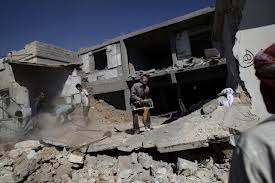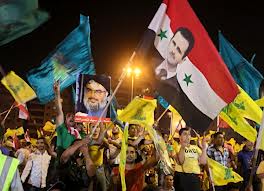 Beirut, Lebanon- Syrian warplanes fired missiles into Lebanese territory on Monday, heightening the potential for Syria’s neighbors to be pulled into its 18-month-old conflict.
Beirut, Lebanon- Syrian warplanes fired missiles into Lebanese territory on Monday, heightening the potential for Syria’s neighbors to be pulled into its 18-month-old conflict.
Such spillover has rocked the delicate political balance in Lebanon, where rival sectarian political forces have thrown their support behind opposing sides in Syria’s civil war.
“As conditions deteriorate, we see dangerous implications for Syria’s neighbors,” Robert Serry, the United Nations special coordinator for the Middle East peace process, told the U.N. Security Council on Monday.
Hours after the strike, Hassan Nasrallah, the leader of the Lebanese Shiite political party and militant group Hezbollah, made a rare public appearance before tens of thousands of protesters in Beirut’s southern suburbs.
Hezbollah had called for demonstrations to protest a video mocking the Prophet Muhammad, but the gathering also served as a show of political force by the movement, which remains a supporter of Syrian President Bashar al-Assad. Hezbollah’s Sunni and Christian rivals in Lebanon have largely backed Syria’s rebel fighters.
The Lebanese government’s quiet response to the Syrian missile strikes underscored just how deep and fraught those divisions remain.
Lebanon’s state-run National News Agency and other local television stations reported that three missiles hit on the outskirts of the border village of Arsal on Monday morning after warplanes flew low over the village in pursuit of fleeing Syrian rebels. A spokesman for the Lebanese Army played down the incident, saying the missiles had actually struck Syrian territory. The Lebanese Army includes all sects of Lebanese society and has found itself caught between the country’s rival forces.
The turnout in support of Hezbollah dwarfed the crowds that came out on Sunday for Mass in downtown Beirut with Pope Benedict XVI, who wrapped up his three-day trip to Lebanon with a public plea for peace, reconciliation and interreligious harmony.
It was widely assumed that Hezbollah held off on joining the outpouring of anger across the region in response to the video until after the pope left, so as not to jeopardize the historic trip. The Shiite group has a powerful presence within the Lebanese government and walks a delicate road between hard-line militancy and the more pragmatic demands of governance and coexistence in the fractured country.
At Monday’s rally, protesters marched through the streets chanting “Death to America” and “America is the great Satan.”
The protest was peaceful and orderly and held far from the U.S. Embassy, which is in the hills outside of Beirut.
 Sprinkled throughout the crowd among Hezbollah’s yellow and green banners were Syrian flags with Mr. Assad’s portrait.
Sprinkled throughout the crowd among Hezbollah’s yellow and green banners were Syrian flags with Mr. Assad’s portrait.
It was Mr. Nasrallah’s first public appearance since December 2011. He called on the U.S. to close down any websites that continue broadcasting the video, and called on international organizations to make denigration of monotheistic religions a violation of international law.
Tens of thousands of Hezbollah supporters surged through the streets when Mr. Nasrallah appeared on stage in Beirut’s Shiite-dominated suburbs, rushing for a rare glimpse of the charismatic leader who makes most of his public appearances via satellite link for fear of assassination.
Mr. Nasrallah began his speech with a Quranic verse warning that those who oppose the Prophet will be cursed and destroyed. “Destroyed were the hands of Abu Lahab and he lay utterly doomed…,” the verse begins.
“This is the start of a serious movement that must continue all over the Muslim world in defense of the prophet of God,” Mr. Nasrallah said.
WSJ

Leave a Reply
You must be logged in to post a comment.